
Palais Outstanding Doctoral Student Award
Professor Emeritus Joseph Palais and his wife Sandra established the Palais Outstanding Doctoral Student Award. The award is presented annually to the best graduating doctoral student in the electrical engineering program. Candidates must have a minimum GPA of 3.75 and at least one journal or conference publication. Faculty members nominate students within the program each year. The recipient receives $1,000 and a commemorative plaque.
2023–24 Sreenithy Chandran

Sreenithy Chandran came to the Ira A. Fulton Schools of Engineering at Arizona State University to study for her master’s degree in electrical engineering due to the impactful research conducted by Sun Devil faculty and students. She desired to conduct research under experts in computer vision, the field in which computers can extract and process information from images captured with a camera for tasks such as object recognition or scene understanding.
“My time at ASU has been the best years of my life,” Chandran says. “I’ve gathered memories for a lifetime, immersed in an environment that has fostered my personal and professional growth.”
After finishing her master’s degree from the School of Electrical, Computer and Energy Engineering, part of the Fulton Schools, Chandran returned to ASU to earn her doctoral degree, continuing her path in electrical engineering. During the course of her doctoral program, she took full advantage of the opportunities available to her.
For her research, Chandran focused on computational imaging, which combines computer vision, machine learning and optics principles to capture details normally not visible in a traditional photograph. Her dissertation focused on novel projector-camera systems which can see objects clearly through fog and smoke, visualize human veins beneath the skin and track a moving person around a corner without taking an image of them directly. In addition, she got experience applying her knowledge to solving real-world problems through internships at Google, Meta Reality Labs and Adobe Research.
2022–23 Ashwin Chandwani
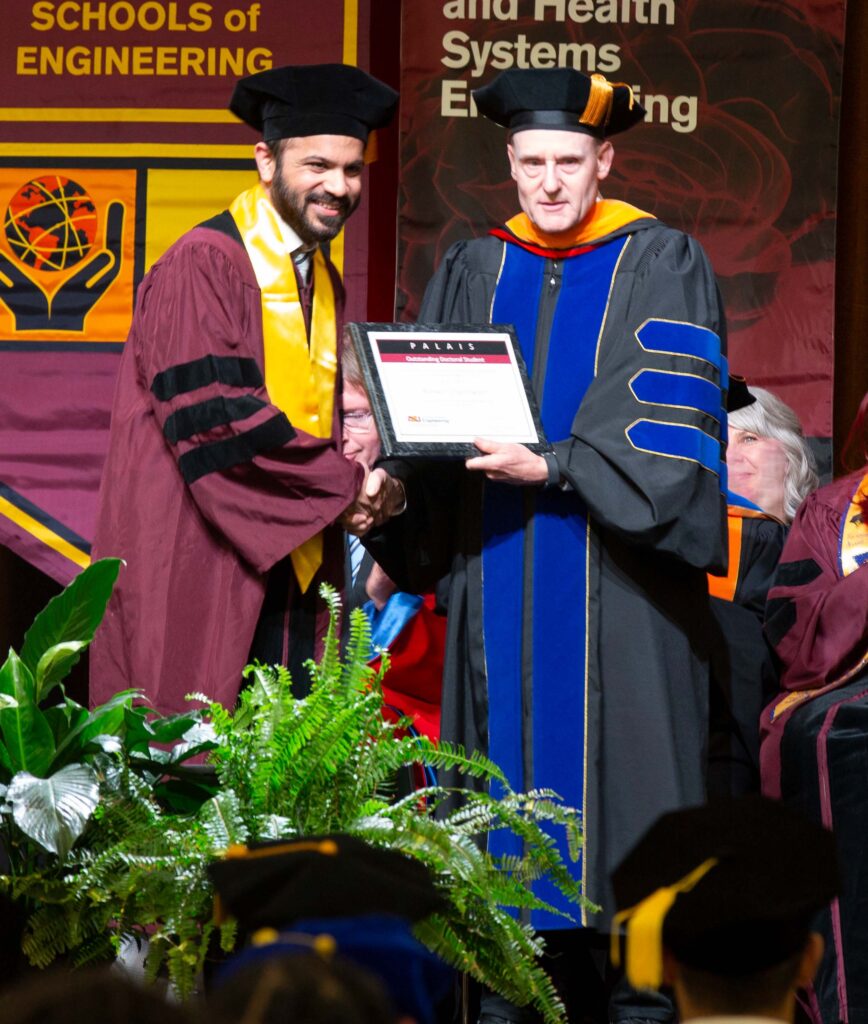
Ashwin Chandwani came to the Ira A. Fulton Schools of Engineering at Arizona State University for the diverse cultural environment represented at ASU and its research and academic excellence.
After graduating from ASU’s School of Electrical, Computer and Energy Engineering, part of the Fulton Schools, with his master’s degree in electrical engineering, Chandwani decided to continue his education with a doctoral degree and pursue research in advanced power electronics converters.
Chandwani focused his research on the design, modeling and control of converters for electric vehicle chargers, renewable energy resources, data centers and more. He chose the field because of a fascination with the ability of semiconductor materials to convert and regulate large amounts of electrical power.
“I enjoy designing a converter from scratch,” Chandwani says. “Witnessing my efforts culminate in the successful operation of the converter, after hours of work and perseverance, is an incredibly rewarding experience.”
In the course of his degree program, he transcended disciplinary boundaries to incorporate fields such as machine learning, cybersecurity and power resiliency into his work with power electronics converters.
2021–22 Kristen Jaskie
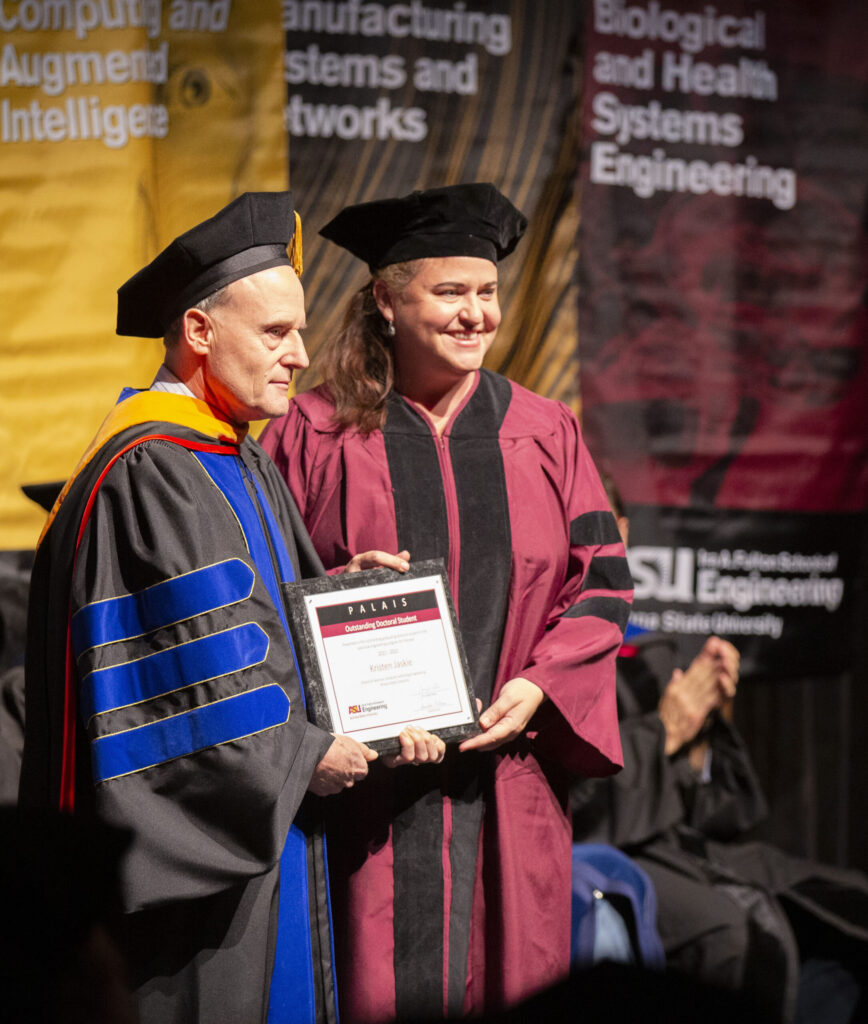
It’s not easy to gain deep expertise in the more complex areas of engineering and technology, and it’s even more difficult in fields that are rapidly evolving, spawning new questions and mysteries.
But Kristen Jaskie says she’s a perfect fit for the challenges posed by the advanced studies and research she has been involved in for seven years.
“I am by nature very stubborn,” Jaskie says, which she notes has served her well in both higher education pursuits and her personal life.
She is a postdoctoral research scholar in the School of Electrical, Computer and Energy Engineering, one of the seven Ira A. Fulton Schools of Engineering at Arizona State University. Jaskie’s primary research focus is on novel applications of machine learning, which is interconnected with the broader field of artificial intelligence.
She uses machine learning and deep learning algorithms to solve complex problems with large amounts of missing data. Jaskie’s work focuses on semi-supervised learning and positive and unlabeled learning problems. Algorithms like these can be used in medicine and other scientific and commercial applications.
2020–21 Hong Chen
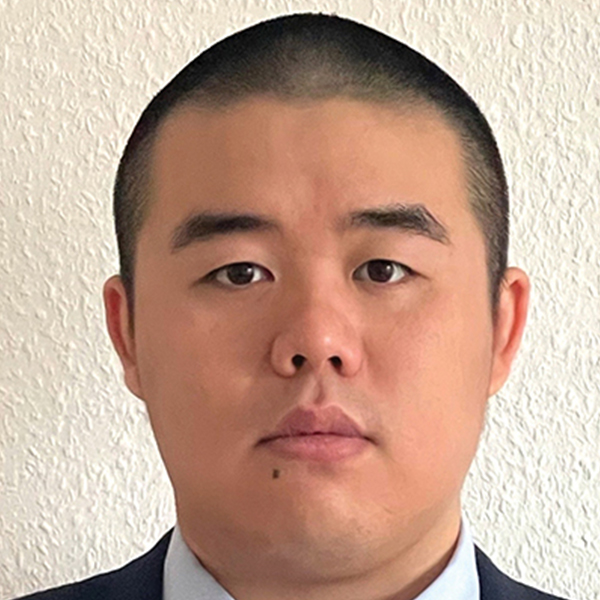
When you ask Hong Chen about his research and achievements at Arizona State University, he very humbly tells you about the technical aspects of his research, such as investigating methods that will one day enable researchers to study new quantum phenomena at a much smaller scale.
He might also tell you about how he was just one of many in a very competitive graduating class receiving accolades.
But what he fails to mention is how he is quickly becoming one of the greatest minds in the field of photonics, a fact that his mentor former Assistant Professor Yuji Zhao is happy to share.
“What he accomplished here at ASU is just phenomenal,” Zhao says. “It goes far beyond the quantity of work, but the depth and quality that set him apart from other students.”
While at ASU, Chen was the first author on seven research papers, collaborated on many others and was highly cited amongst other researchers. He also presented twice at the Conference on Lasers and Electro-Optics (CLEO), the key conference in the optics community.
2019–20 Junjie Jiang
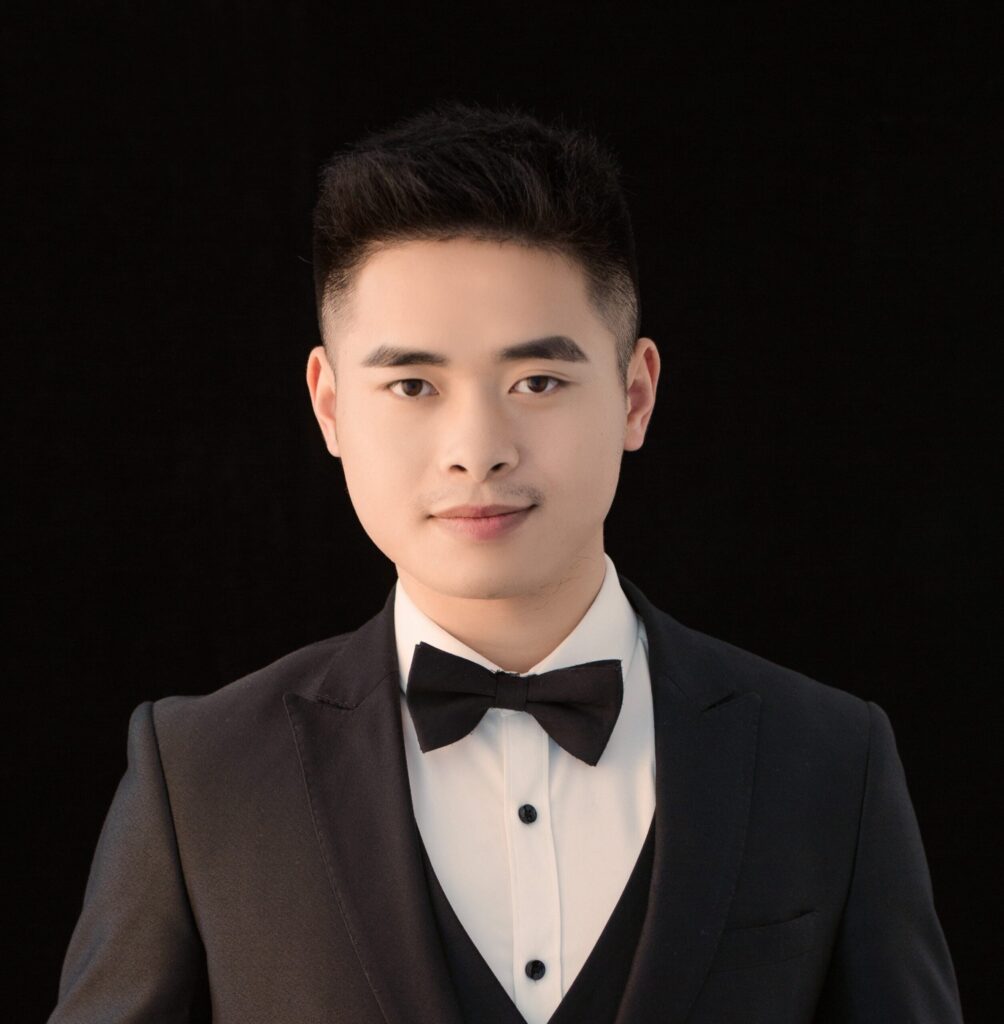
Junjie Jiang grew up in Huzhou City in China’s Zhejiang Province. The city is relatively small and close to the Yangtze River Delta Economic Zone. Its dense network of waterways and canals sparked a young Jiang’s interest in complex systems.
After receiving his undergraduate degree in theoretical physics from China’s Lanzhou University, Jiang came to Arizona State University as a short-term visiting scholar to research nonlinear time series analysis. Under the mentorship of Regents Professor Ying-Cheng Lai, this brief venture turned into a career-defining passion for complex dynamical systems.
Knowing he wanted to continue his research at ASU with Lai, Jiang applied and was accepted to the master’s degree program and later to the doctoral degree program in electrical engineering.
As a theoretical researcher, Jiang concentrated his studies on one of the most complex dynamical systems on Earth — the ecosystem.
“The ecosystem is currently facing its greatest challenges and crises due to human activities such as global climate changes and pollution,” he says.
Jiang’s research aims to solve two of the biggest questions evolving from this complex nonlinear dynamical system: When will our ecosystem reach a point of no return and how can we prevent its total collapse?
2018–19 Houqiang Fu
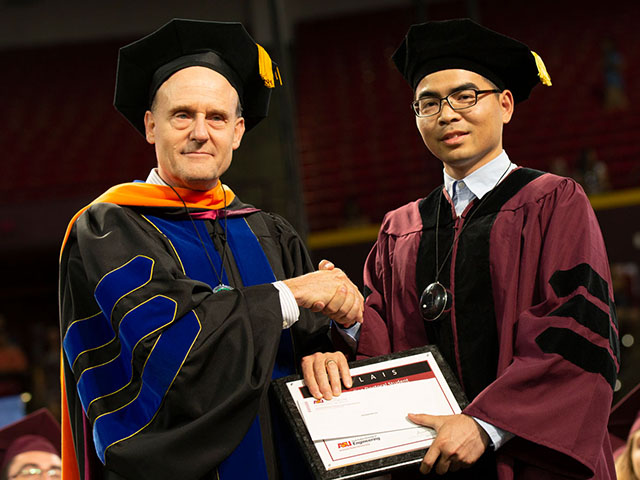
Now an assistant professor at Arizona State University in electrical engineering, Houqiang Fu successfully defended his dissertation and received his doctoral degree in 2019 from the Ira A. Fulton Schools of Engineering, where he researched gallium nitride power electronics that operate more quickly and efficiently than traditional designs o save energy.
His work in this area earned him the 2019 Palais Outstanding Doctoral Student Award for research and academic excellence.
Gallium nitride is what is known as a wide-bandgap semiconductor material. Its material properties allow for semiconductor devices to be smaller and operate more efficiently at higher voltages, frequencies and temperatures than silicon-based semiconductor materials.
Currently, about 10% of the total electricity generated in the United States is lost through power conversion using silicon-based devices. With silicon power electronics having reached their performance limit, Fu’s research demonstrated gallium nitride power electronics can be smaller, faster and more efficient.
2017–18: Zhengshan (Jason) Yu
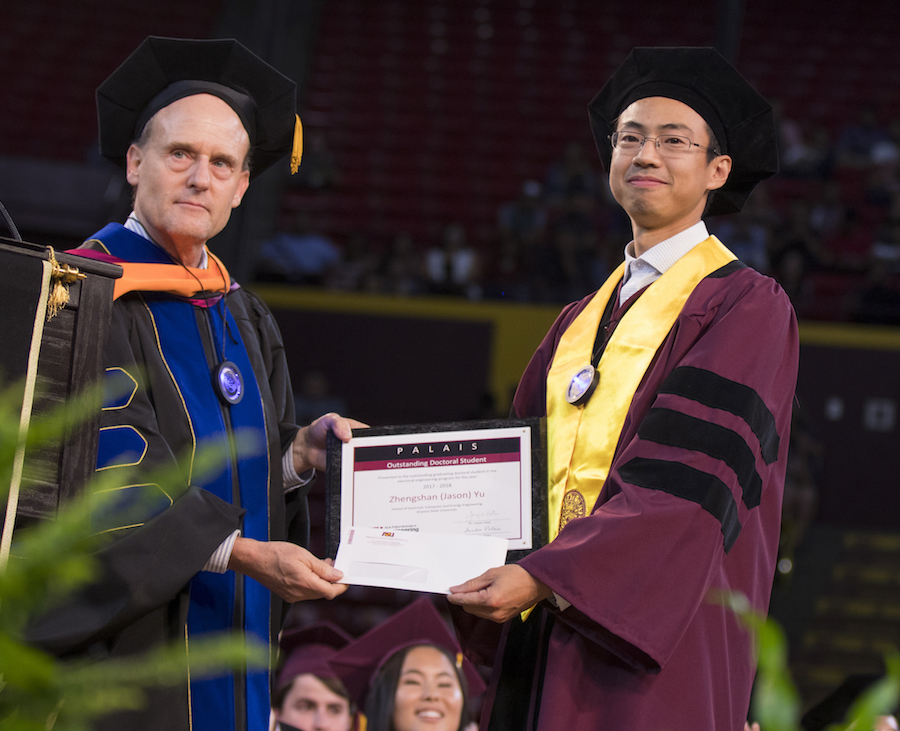
Now a research assistant professor of electrical engineering at Arizona State University’s Ira A. Fulton Schools of Engineering, Zhengshan (Jason) Yu was an international student from Jinhua, China, who conducted research under faculty advisor Zachary Holman.
Yu earned the Palais Outstanding Doctoral Student Award for his research on record-breaking efficiency for silicon-based solar cells, an area that has the potential to make solar electricity costs more competitive in the future.
While living in Shanghai, he noticed the poor air quality in winter due to vehicle emissions and the burning of fossil fuels as the country’s main energy source.
Air pollution poses an environmental risk to health as people inhale dangerous toxins, which can lead to heart and lung disease as well as other respiratory problems, according to the World Health Organization. The motivation to solve the problem fueled Yu’s research interest in renewable energy.
2016–17: Preston Webster
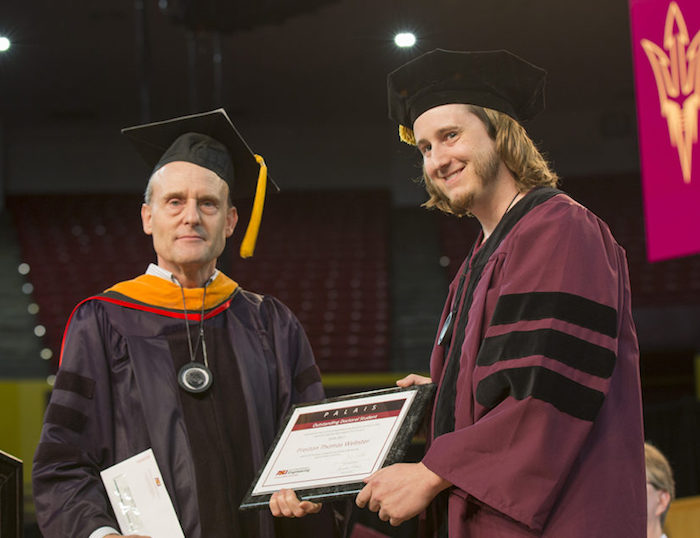
Preston Webster, who hails from Bloomfield, Iowa, earned his bachelor’s degree in electrical engineering from Iowa State University before enrolling at Arizona State University to pursue his doctoral degree. At ASU, Webster distinguished himself by contributing to eight peer-reviewed publications, serving as the first author on four of those and securing a U.S. patent.
He also has three invention disclosures to ASU, all related to his research on optoelectronic materials, which can source, detect and control light in all of its various forms.
Webster and electrical engineering Research Scientist Shane Johnson, his dissertation advisor, worked on the development of new optoelectronic materials with a range of uses, including thermal imaging and tracking, solar technology, high-efficiency lasers and LEDs and defense applications.
2015–16: Zhicheng Liu
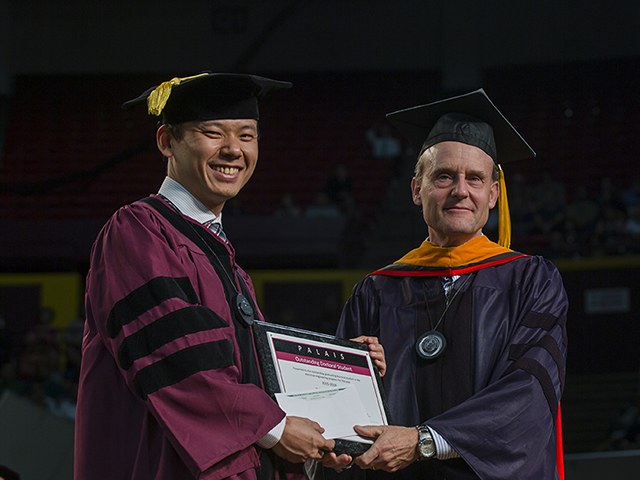
Over the past seven years, Zhicheng Liu has distinguished himself both in the classroom with a 3.93 GPA and in the lab, contributing to more than 10 journal publications. In 2013, he completed his first primary authored publication, which included research he conducted in former electrical engineering Professor Cun-Zheng Ning’s lab.
Originally from the Hebei province in China, Liu earned his bachelor’s degree in physics from Peking University. He said he was drawn to ASU due to his background in working with lasers and his interest in the research happening at the university.
“I wanted to work with this group because I knew I could learn a lot and work with some very advanced equipment,” Liu says.
Liu went on to work in Albuquerque, New Mexico with Skorpios Technologies as a senior engineer, where he’s in charge of reliability testing of transceiver products.
2014–15: Xiaowen Gong
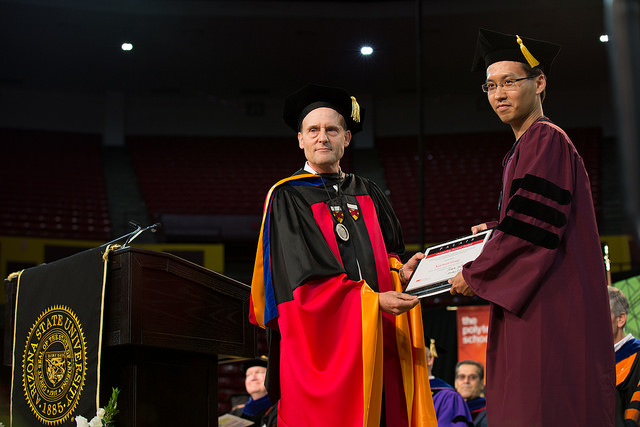
Xiaowen Gong was chosen as the 2014–15 winner of the Palais Outstanding Doctoral Student Award. He graduated in Spring 2015 after completing his degree under the supervision of Junshan Zhang, a former professor in the School of Electrical, Computer and Energy Engineering.
Gong has published seven journal papers and 17 conference papers. He went on to become a postdoctoral researcher at The Ohio State University after graduation, where his research interests lay in the general field of computer communication networks, with a focus on social computing and networks, security and privacy.
He graduated with a 4.0 GPA at Arizona State University and received the IEEE International Conference on Computer Communications (INFOCOM) runner-up Best Paper Award in 2014.
“It is a great honor, and I am very pleased to have received this distinguished award from ECEE,” Gong says.
2013–14: Kang Ding
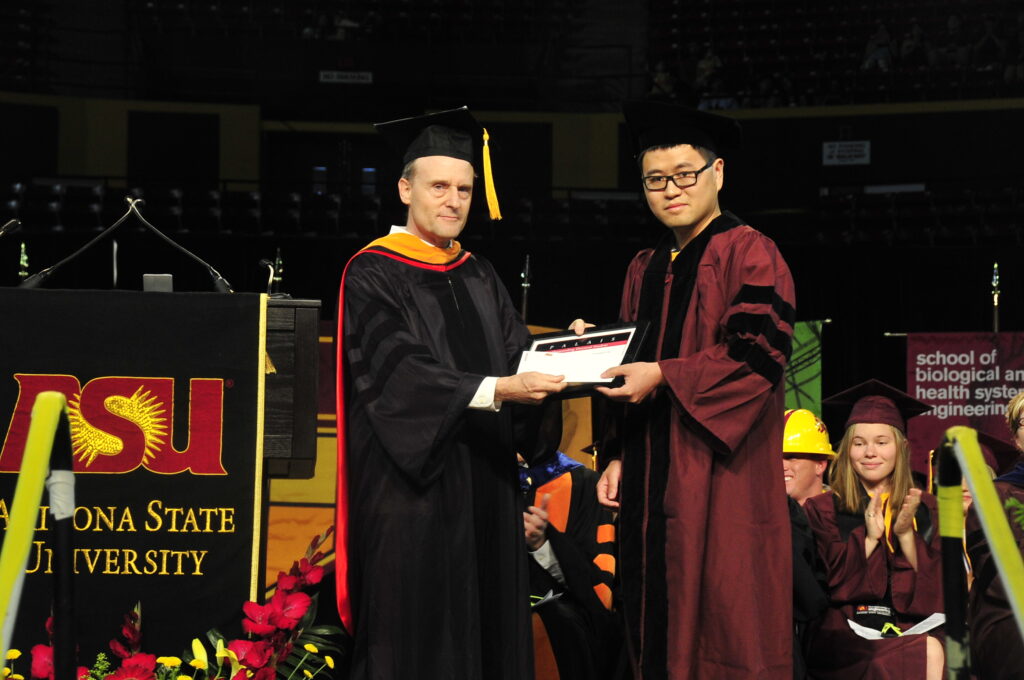
Kang Ding was chosen as the 2013–14 winner of the Palais Outstanding Doctoral Student Award. Former electrical engineering Professor Cun-Zheng Ning was his advisor.
Ding has published more than nine journal papers and presented more than 13 conference papers, primarily in the area of metallic and plasmonic nanolasers. He and his team were the first in the world to demonstrate a room temperature nanolaser under electrical injection.
He had a 4.0 GPA while at Arizona State University until his graduation in 2014. Before attending ASU, Ding graduated from Peking University in 2008.
2012–13: Xuan Ni
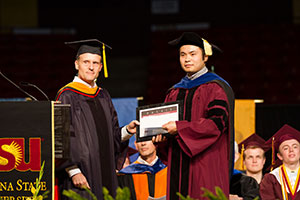
Xuan Ni received the 2012–13 Palais Outstanding Doctoral Student Award. His mentor was Regents Professor Ying-Cheng Lai.
Having graduated in 2012 with a perfect GPA, Ni also authored a dozen papers in high-impact refereed journals such as Physical Review E, Europhysics Letters and Chaos.
2011–12: Elizabeth Steenbergen
Elizabeth Steenbergen is the recipient of the 2011–12 Palais Outstanding Doctoral Student Award. Her mentor was Professor Yong-Hang Zhang.
Steenbergen was at the top of her class with a 4.0 GPA, which she had maintained since her undergraduate studies. She has several papers accepted by publications and has received many awards for her outstanding contributions to the field.
She worked as an intern at the Air Force Research Lab with aspirations to work at the U.S. Department of Defense or a national laboratory. She aims to advance the country in technological applications and to teach engineering students at a university.
2010–11: Asaad Said
Asaad Said received the Palais Outstanding Doctoral Student Award for 2010–11. His mentor was Professor Emeritus Lina Karam.
Said’s doctoral research resulted in outstanding contributions to the field of automated image analysis and classification, cancer detection and diagnosis and industrial automation for semiconductor manufacturing. He worked as a research scientist at Intel after graduation.
2009–10: Qingfei Chen
Qingfei Chen is the recipient of the 2009–10 Palais Outstanding Doctoral Student Award. His mentor was Regents Professor Ying-Cheng Lai.
Chen earned a 4.0 GPA and produced an outstanding publication record of 17 journal papers, all published in first-rate refereed publications such as Applied Physics Letters, Physical Review and Chaos.
2008–09: Liang Huang
Liang Huang received the 2008–09 Palais Outstanding Doctoral Student Award. Huang worked as a postdoctoral student for Regents Professor Ying-Cheng Lai.
2007–08: Visar Berisha
The 2007–08 Palais Outstanding Doctoral Student Award was given to Associate Professor Visar Berisha.
After graduation, he worked at the Massachusetts Institute of Technology’s Lincoln Labs, then returned to ASU to become a faculty member in both the School of Electrical, Computer and Energy Engineering and the College of Health Solutions. His mentor was Professor Andreas Spanias.
2005–06: Jiangbo Wang and Shuiqing Yu
Jiangbo Wang was advised by Professor Yong-Hang Zhang on his thesis, “Electric and Optical Properties of Novel Semiconductor Heterostructures,” and joined Philips Lumileds Lighting Company as a senior development scientist after his graduation.
Shuiqing Yu was also advised by Professor Yong-Hang Zhang. Yu worked to develop optical cooling devices in Zhang’s postdoctoral research group after graduation.
2004–05: Irena Knezevic
Irena Knezevic received the Palais Outstanding Doctoral Student Award for 2004–05. She was advised by Professor Emeritus David Ferry. After graduation, she accepted a position as an assistant professor at the University of Wisconsin at Madison.
Her research focused on quantum electronic transport, quantum information and semiconductor device simulation.
2003–04: Elias Kyriakides
Elias Kyriakides received the Palais Outstanding Doctoral Student Award for 2003–04. He was advised by Professor Emeritus Gerald Heydt, who he went on to work with investigating parameter identification of synchronous generators as a faculty research associate after graduation.
Kyriakides’ goal was to pursue a career in academia and develop a successful independent research program in electrical engineering with a concentration in power systems.
2002–03: Lucian Shifren
Lucian Shifren was the inaugural recipient of the Palais Outstanding Doctoral Student Award in 2002–03. He was advised by Professor Emeritus David Ferry and went on to work at Intel as a senior CAD designer for transport and device modeling.